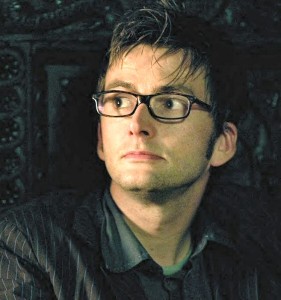Desert Island Discs evokes strong memories for me. As a kid, when I was in the car with my dad travelling home after a weekend, it would invariably be on and I would be subjected to listening to people I’d never heard of being interviewed, choosing pieces of classical music I had no interest in.
David Tennant saturation…
 You just might have noticed that there are a couple of Doctor Who episodes showing on BBC1 during this festive period.
You just might have noticed that there are a couple of Doctor Who episodes showing on BBC1 during this festive period.
What’s more, they are the last appearances as the Doctor by David Tennant – a role he has played for the past four years.
It’s generally accepted that Tennant has played a blinder as the time-travelling Gallifreyan, something no-one thought possible when he took over from Christopher Eccleston, back in 2005.
I’m a big fan and have already watched the Christmas Day episode and am looking forward to the final throw of Tennant’s (and Russell T Davies’) dice on New Year’s Day.
What I do object to, though, is the utter Doctor Who – and of David Tennant, in particular – saturation across the BBC in the last couple of weeks.
He alone is apparently making 75 appearances on the BBC over Christmas and New Year.
I’ve seen him presenting Never Mind the Buzzcocks, as a panellist on QI and a guest on Alan Carr’s Chatty Man. I’ve also heard him on radio being interviewed by Kirsty Young for Desert Island Discs, co-presenting the Jonathan Ross Saturday morning R2 slot with Catherine Tate, interviewing Dr Who collaborator Russell T Davies on R2 for a show called Who on Who and at least one other appearance I can’t remember.
Surely, this is total overkill? Most of us understand the need to plug important shows, but there’s a limit to the amount of exposure one show/man can expect.
Worst of all, it doesn’t even seem to have worked that well. Christmas Day viewing figures showed that, although 10 million people tuned in to see Tennant in action, it was only the 3rd most watched programme behind EastEnders and the Royle Family, and down on both of the previous two years’ audiences.
The Tennant exposure is not the first time that the BBC has been accused of overfilling schedules this year. When U2 released their new album back in February, the BBC came in for flak for heavily plugging the launch of No Line On The Horizon on Radio 1, 2, 4 and BBC2.
On the one hand, this shows how popular the BBC is and how many external outlets desperately want to be linked to its important shows, but it also gives weight to those naysayers who are trying to reduce the BBC’s power and influence.
Let’s just hope the New Year’s Day episode of Doctor Who does well, because otherwise poor David Tennant’s efforts will be sorely in vain.
Why the X Factor judges aren’t as clever as they think
Last night was George Michael night on X Factor – a particularly ill-starred night as far as the contestants went, with a number of duff performances.
Yet again, Joe McElderry was the star of the show with his version of Don’t Let The Sun Go Down On Me. As Louis Walsh – Mr Rulebook for this year’s X Factor – pointed out, it’s technically an Elton John track and not a George Michael one. George only guested on it.
Surprisingly, though, none of the judges picked up on the fact that Stacy Solomon also sang a technically ‘illegal’ song. I Can’t Make You Love Me was indeed recorded by George Michael, as part of Double A Side back in 1997 with Older, but that was a cover version.
The original rendition was recorded by Bonnie Raitt. Clearly Louis, Cheryl, Dannii and Simon don’t know their music as well as they think they do.